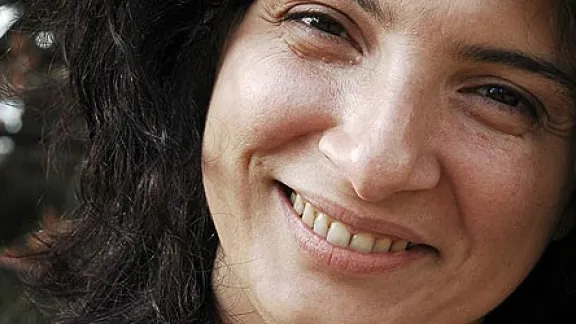
CAREF representative Gabriela Liguori is the daughter of Italian migrants to Argentina. © LWF/H. Putsman Penet
LWF-backed Group Engages in Global Process on Migration
Gabriela Liguori is an Argentine social worker whose work on fighting trafficking and commercial exploitation of human beings illustrates how church groups can interact with international organizations on the topic of migration.
Liguori represents CAREF, the Argentine ecumenical relief organization for refugees and migrants, which gets support from The Lutheran World Federation (LWF) and other church-related organizations.
“We’re concerned about the commitment of churches in the context of vulnerability of human rights,” Liguori told Lutheran World Information (LWI) on a recent visit to Geneva. She spoke about CAREF, which was established in 1973 to focus on refugees and migration, and increasingly works on human trafficking.
Human trafficking is an issue that has come to the fore for CAREF in the last seven years, said Liguori, the daughter of Italian migrants to the South American country.
She pointed out that trafficking for sexual exploitation is more visible than for labor purposes in Argentina, which is a destination country for women arriving from Paraguay and the Dominican Republic. It is also the exit place for women exported to Spain and Italy.
Between 2009 and 2011, CAREF, supported by the LWF Department for Mission Development, produced a study titled: “Trafficking and commercial exploitation of human beings in Argentina, Bolivia, and Paraguay: contributions for a regional and ecumenical dialogue.”
The study found that human trafficking practices occur at both national and international levels but that there were remarkable differences among the three Latin American countries in view of their social and political realities.
Miscommunication about Migrants’ Contribution
The International Organization for Migration (IOM) noted in December 2011, that “There are more people on the move than at any other time in recorded history: about 215 million international and 740 million domestic migrants moving within their own territory.”
With about 7 billion people in the world, “that means about one out of every seven people is on the move,” the IOM points out. Every country in the world is either dependent on the labor, skills and knowledge migrants bring or on the estimated USD 404 billion they remitted in 2011, adds the IOM.
The migration body notes that distorted communication about migration contributes to widespread anti-migrant sentiments that have resurfaced in many parts of the world. It sees an urgent need to help migrants “have a voice in the public arena so they can speak for themselves and talk about the contribution they are making.” Its 60th anniversary report focuses on “Communicating Effectively about Migration.”
CAREF takes part in the Global Forum on Migration and Development (GFMD) which will hold its November 2012 summit in Mauritius. It is the largest and most comprehensive global platform for dialogue and cooperation on international migration and development, and 160 governments took part in the 2011 meeting. Liguori explained the GFMD “is not an event” but a process that started in 2006 as a high-level dialogue in the United Nations (UN) to talk about the migration issue beyond the UN.
At the last GFMD meeting, “We noticed that unfortunately when we met in common space to talk about migration, development and human rights, there was not a word from the [United States of America] or European nations, the most important receiving countries. Governments that said something were those that have people who emigrate,” she remarked.
Human Rights Framework
“Governments resist talking about migration within a human rights framework. Often they only seem interested in preventing irregular migration. The power countries are interested in the migrant as a worker, or in the remittances,” she noted.
She explained that “restrictive policies” make people become “irregular migrants.” So an ecumenical group such as CAREF needs to raise the voices of the migrants.
In Argentina, CAREF participated very strongly in a social and political process that involved faith-based groups and civil society organizations in advocating for “a law in our country that was passed in 2003, in which migration is recognized as a human right,” said Liguori.
One of the ways CAREF’s work can be supported by church-related organizations such as the LWF is by developing resources that offer theological and biblical perspectives for pastors and local leaders to deal with migration, Liguori added.
Rev. Dr Patricia Cuyatti, LWF area secretary for Latin America and the Caribbean (LAC) affirmed the LWF member churches’ support for CAREF in advocacy and awareness raising “about human traficking that is deeply interconnected with voluntary or forced migration in the region.”
She emphasized that “education and empowerment, especially of women and girls regarding their self dignity and responsibility for sexuality are meaningful actions for the LAC region.
“Through CAREF’s ministry, the LWF member churches interact with other Christian denominatios in Argentina, Bolivia, Paraguay and Uruguay, promoting transformation at different levels in society,” Cuyatti added.
(807 words)


